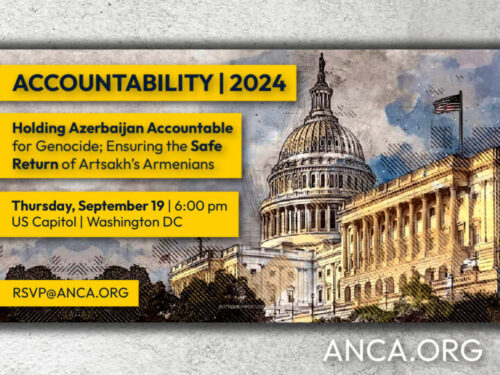ANCA Hosting “Accountability | 2024” – a Capitol Hill Gathering Demanding Justice for Azerbaijan’s Genocide of Artsakh’s Armenians
The Congressional program will cap a two-day ANCA advocacy “fly-in” by community activists
August 23, 2024WASHINGTON, DC – Congressional leaders, community activists, and coalition partners will gather on Capitol Hill on September 19th for a program dedicated to holding Azerbaijan accountable for its 2020-23 genocide of Artsakh (Nagorno-Karabakh), calling for the safe return of indigenous Armenians under a global mandate and international protection, reported the Armenian National Committee of America (ANCA).
The event, which will start at 6:00 pm on September 19th, marks the first anniversary of Azerbaijan’s brutal September 19-20, 2023 military offensive against Artsakh, which culminated – after ten months of blockade, in the genocidal ethnic cleansing of over 120,000 ethnic Armenians from their historic homeland.
“We are gathering from across America in Washington to hold Azerbaijan accountable – via a statutory prohibition on military aid and the enforcement of sanctions against Aliyev’s genocidal regime,” said ANCA Executive Director Aram Hamparian. “The United States can and must reverse this reversible genocide by leading a UN Security Council resolution establishing a mandate for the return of Artsakh’s indigenous Armenians under international protection.”
The program will feature remarks from U.S. Senators and Representatives, underscoring the critical importance of U.S. leadership in sanctioning Azerbaijan, providing aid to Artsakh genocide survivors, and advocating for the safe return of Armenians to Artsakh.
The Capitol Hill program will cap a two-day advocacy “fly-in” organized by the ANCA Eastern and Western regions, bringing chapter leaders and activists from across the U.S. to the nation’s capital to advance a broad array of measures to secure justice for Azerbaijan’s genocidal actions and support the security and sovereignty of Armenia.
In addition to the powerful speeches, “Accountability | 2024” will feature a poignant photo exhibit by renowned photographer David Ghahramanyan. The exhibit will spotlight the atrocities committed during the 2020 44-day war against Artsakh and Armenia, as well as the devastating 2023 blockade of Artsakh that led to the forced exodus of the Armenian population. Ghahramanyan will be accompanied by Hermine Avagyan, the Executive Director of the Artsakh office of the Hamazkayin Armenian Educational and Cultural Society, who will discuss the impact of Azerbaijan’s genocide against Artsakh’s Armenian population.
In September 2023, following a brutal 10-month humanitarian blockade, Azerbaijan launched a military assault on Artsakh, forcibly displacing the region’s entire Armenian population. The over 100,000 Armenians ethnically cleansed from Artsakh in 2023 joined over 50,000 displaced as a result of Azerbaijan and Turkey’s 2020 attacks in Armenia, where they now face dire challenges in access to housing, food, employment, medical care, social and psychological services, and basic staples.
Despite the statements of former Acting Assistant Secretary of State Yuri Kim before the Senate Foreign Relations Committee last year noting that the U.S. “will not countenance any action to ethnically cleanse Armenian population of Nagorno-Karabakh” – and a commitment by current Assistant Secretary James O’Brien before the House Foreign Relations Committee that there would be “no business as usual” with Azerbaijan – Baku has faced no material consequences for its military assault on Nagorno-Karabakh in 2023, nor its assault on the region in 2020 which saw the targeting of civilian infrastructure including hospitals, the use of prohibited weapons, and the summary execution of civilians.
Azerbaijan continues to occupy almost 100 square miles of Armenian sovereign territory in the southern regions of Syunik, Vayots Dzor, and Gegharkunik, following military incursions into Armenia in May 2021 and September 2022. In recent months, Azerbaijan has used coercive diplomacy and threats of force to impose demands on Armenia – resulting in Armenia’s unilateral concession of four villages in the northern region of Tavush.
Azerbaijan continues to violate the orders of the International Court of Justice (ICJ) to prevent the mistreatment of captured Armenians and ensure the protection of Armenian cultural heritage sites. The Aliyev regime continues to detain at least 23 Armenian prisoners of war and civilian captives – including former representatives of Nagorno-Karabakh’s government – which human rights groups have noted are subject to torture and abuse in custody. In recent weeks, experts have verified Azerbaijan’s escalating destruction of Armenian cultural heritage sites in territories captured through force last year.
The International Court of Justice (ICJ) ordered Azerbaijan to ensure the safe return of Armenians from Nagorno-Karabakh. These calls to uphold the right of return for Nagorno-Karabakh’s Armenians have been affirmed on several occasions by U.S. officials. However, no material action has been taken to facilitate an internationally protected right of return – nor to ensure that the return of Armenians is made a condition of any peace agreement between Armenia and Azerbaijan.
The ANCA maintains that accountability is a prerequisite for a just and durable peace in the region – including 1) enforcing prohibitions on U.S. military assistance to Azerbaijan according to Section 907 of the FREEDOM Support Act, 2) the imposition of Global Magnitsky Act Sanctions on Azerbaijani officials responsible for war crimes, 3) an investigation into Azerbaijani human rights abuses under Section 502B(c) of the Foreign Assistance Act, and; 4) a commitment to ensuring the right of Armenians to return to their homes under international protections. This must be matched with a robust humanitarian response to meet the needs of Armenian refugees in Armenia.
#####
